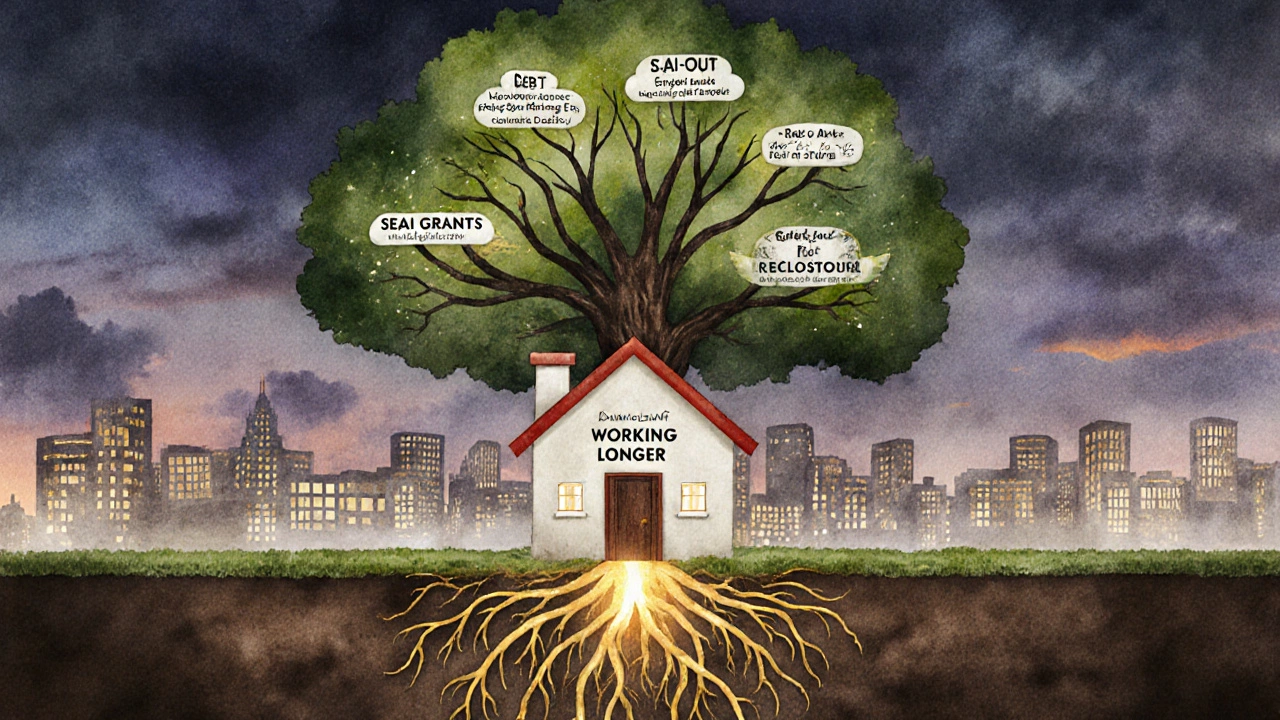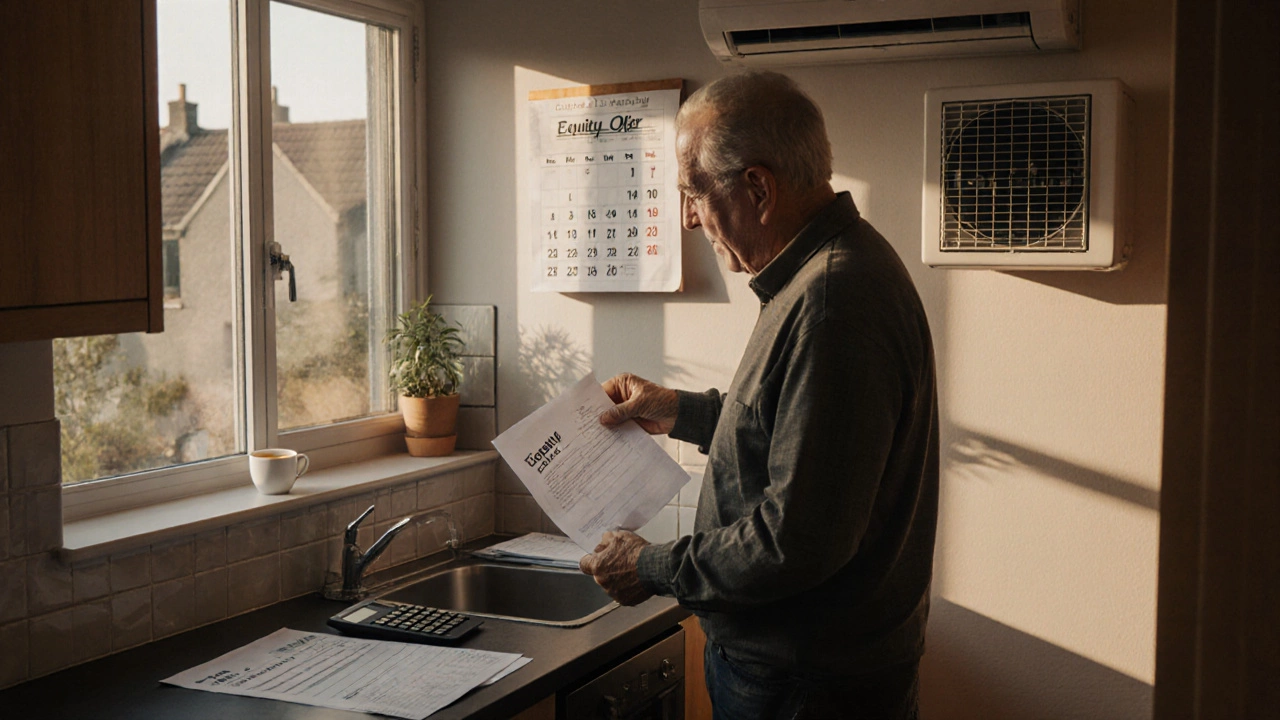Equity Release Cost Calculator
Your Home Equity
Equity Release Options
Cost Comparison
Enter your details above to see how equity release compares to other options.
Most people think of their home as a place to live, not a bank. But when bills pile up, unexpected costs hit, or retirement feels far off, the idea of tapping into your home’s value starts sounding tempting. Equity release-taking money out of your home-sounds simple: you own the house, so why not use it to get cash? The truth is more complicated. In Ireland, where house prices have climbed over 80% since 2018 and interest rates are still near 5%, this decision can change your financial future-forever.
What exactly is equity release?
Your home equity is the part of your house you actually own. If your house is worth €400,000 and you still owe €150,000 on your mortgage, your equity is €250,000. Equity release lets you turn that locked-in value into cash without selling the house. There are three main ways to do it: a home equity loan, a cash-out refinance, or a reverse mortgage.
A home equity loan gives you a lump sum, fixed interest, and fixed monthly payments. It’s like a second mortgage. A cash-out refinance replaces your current mortgage with a bigger one, pocketing the difference. A reverse mortgage-mostly for people over 62-lets you get payments from the bank without paying anything back until you die or move out. Each has different costs, risks, and rules.
Why people do it-and why it backfires
People use equity release for real needs: fixing a leaking roof, paying for a child’s university fees, covering medical bills, or even funding a small business. In Dublin, many homeowners used equity to pay for energy upgrades after the SEAI grants changed in 2023. Others used it to pay off high-interest credit card debt, thinking they were being smart.
But here’s the trap: using home equity to pay for everyday spending-vacations, new cars, or dining out-is like borrowing against your future. You’re not solving a problem. You’re trading one debt for another, with your house as collateral. If you lose your job, get sick, or interest rates rise again, you could end up owing more than your home is worth. In 2024, the Central Bank of Ireland reported a 17% jump in mortgage arrears among homeowners who had taken out second charges. Most of them had used the money for non-essential spending.
How much can you actually take out?
It’s not as simple as grabbing half your equity. Lenders cap how much you can borrow based on your age, income, loan-to-value ratio, and the property’s value. Most banks in Ireland allow you to borrow up to 80% of your home’s value, minus what you still owe. So if your house is worth €400,000 and you owe €150,000, your maximum loan would be €170,000 (80% of €400,000 is €320,000; subtract €150,000 = €170,000).
But lenders also check your ability to repay. If your income dropped after the pandemic, or you’re nearing retirement, they might only let you borrow 60% or less. Reverse mortgages have even tighter rules: you usually need to be over 65, own your home outright or have very little left to pay, and pass a financial assessment.

Costs you can’t ignore
There’s more to equity release than just the loan amount. You’ll pay application fees, legal fees, valuation fees, and sometimes early repayment charges. A home equity loan might cost €1,500-€3,000 in upfront fees. A cash-out refinance can cost even more-up to €5,000-because you’re replacing your entire mortgage.
And then there’s interest. If you take out €100,000 at 5.2% over 20 years, you’ll pay €148,000 in interest alone. That’s nearly as much as the original loan. Compare that to a personal loan at 7% over 5 years: you’d pay €19,000 in interest. The longer the term, the more you pay. Many people don’t realize they’re locking themselves into decades of payments just to get cash now.
What happens when you die?
This is the part most people avoid thinking about. If you take out a home equity loan or cash-out refinance, your estate still has to repay it. If you pass away before it’s paid off, your heirs must sell the house, refinance it, or pay the balance. If they can’t, the bank takes it.
With a reverse mortgage, the loan is repaid when you die, sell the house, or move out. The bank doesn’t take your house unless the debt exceeds the home’s value-but in Ireland, most reverse mortgages have a ‘no negative equity guarantee’. That means your family won’t owe more than the house sells for. Still, that guarantee only works if you meet all the conditions: no missed insurance payments, no major structural damage, and no moving out without telling the lender.
Alternatives you should consider first
Before you touch your home equity, ask yourself: is there another way?
- SEAI grants: If you need home improvements, Ireland offers up to €5,000 for insulation, heat pumps, or solar panels. You can get €3,500 for a heat pump alone.
- Debt consolidation loans: A personal loan at 6.5% over 5 years might cost less than a second mortgage over 20 years.
- Downsizing: Selling a large family home and moving to a smaller one can free up cash without taking on new debt.
- Working longer: Even two more years of work can add €50,000-€100,000 to your retirement savings.
One Dublin homeowner I spoke with used a SEAI grant to replace her old boiler, then used the €12,000 she saved on energy bills over three years to pay for her daughter’s college tuition. She never touched her equity. That’s the kind of smart move most people overlook.

When it might actually make sense
There are times when equity release is the right call. If you’re retired, own your home outright, and need steady income to cover living costs, a reverse mortgage can be a lifeline. If you’re starting a small business and have a solid plan-with proof of income and a repayment strategy-using equity as seed funding might be smarter than a high-interest business loan.
It also makes sense if you’re planning to stay in your home for the next 15+ years. The longer you stay, the more time you have to pay down the new debt and benefit from the cash. But if you’re thinking of moving in five years, you’re better off waiting. Selling now, paying off your mortgage, and buying something cheaper might leave you with more money in your pocket.
Red flags to watch for
Watch out for these warning signs:
- A lender pushes you to act fast-‘This offer expires tomorrow’.
- You’re told you don’t need legal advice.
- The interest rate is higher than your current mortgage by more than 1.5%.
- You’re being sold a product you don’t understand.
- They don’t explain how your heirs will be affected.
These aren’t just bad signs-they’re signs you’re being targeted. In 2024, the Financial Services and Pensions Ombudsman in Ireland received 89 complaints about equity release products. Most involved misleading terms or hidden fees.
What to do next
If you’re seriously considering equity release:
- Calculate your current equity: home value minus mortgage balance.
- Get a free property valuation from two different estate agents.
- Ask your bank for a quote on a home equity loan or cash-out refinance.
- Meet with a fee-based financial advisor (not one tied to a lender).
- Ask your adult children or a trusted friend to review the paperwork with you.
Don’t sign anything on the same day you get the offer. Wait three days. Sleep on it. Ask yourself: will this decision still make sense in five years? In ten? When I’m 75?
Can I lose my home if I take equity out?
Yes-if you don’t keep up with payments. A home equity loan or cash-out refinance is secured by your house. Miss payments, and the lender can start foreclosure proceedings. Even with a reverse mortgage, you must pay property taxes, insurance, and maintain the home. Failure to do so can trigger repayment-and you could lose your home.
Is equity release better than a personal loan?
It depends. Personal loans usually have shorter terms (3-7 years) and higher monthly payments but lower total interest. Equity release spreads payments over 20-30 years, so monthly payments are lower, but you pay far more in interest over time. If you need €20,000 and can repay it in 5 years, a personal loan at 6.5% costs €3,500 in interest. A home equity loan at 5.2% over 20 years costs €11,800. Only choose equity release if you truly can’t afford the higher payments.
Can I still get equity release if I’m under 65?
Yes, but not with a reverse mortgage. Those are only for people 65 and over. However, you can still get a home equity loan or cash-out refinance if you’re under 65, as long as you have stable income, good credit, and enough equity. Most lenders require you to be at least 21.
Does equity release affect my state pension or social welfare?
It depends. If you take a lump sum and keep it in the bank, it could count as savings and reduce your eligibility for means-tested benefits like the Fuel Allowance or Household Benefits Package. If you take monthly payments, those might be treated as income. Always check with Citizens Information before taking any money out. The rules changed in 2023 to be stricter on asset thresholds.
What happens to my equity release if I move to a nursing home?
If you have a home equity loan or cash-out refinance, moving out doesn’t trigger repayment-unless you sell the house. But with a reverse mortgage, moving into long-term care is considered a trigger event. The loan becomes due. Your family will need to repay it by selling the home, refinancing, or paying it off themselves. If they can’t, the lender will take possession.
Equity release isn’t good or bad-it’s a tool. Like a chainsaw, it can help you cut through problems… or seriously hurt you if you don’t know how to use it. The key isn’t whether you can get the money. It’s whether you should. Take your time. Get advice. Think long-term. Your home isn’t just an asset. It’s your security. Don’t trade it for a quick fix.
